朗文新派少儿英语巩固级第4单元知识点
朗文新派少儿英语巩固级复习

owl know feather need
Phrases
paint a fence刷篱笆clean the bedroom收拾卧室
go to the supermarket去超市cut the grass剪草
make the bed整理床铺wash the dishes洗盘子
go shopping购物go for walks散步
go to the movies看电影play games玩游戏
clean the room打扫房间how about如何,怎么样
next day第二天get out of here离开这儿get to到达
look behind向后看start to do开始做某事
Songs
1. <Old MacDonald>
2. <Go Marching>
3. <In the jungle>
Stories
<City mouse and country mouse>
<Why the owl says,”Who”>
Idioms
1. Kill two birds with one stone.
19.She never drives a car.
20.What a good idea!多好的主意啊!
Chants
1.<Hello. Good morning.> (P2-1)
2.<Nothing to Do> (P19)
Songs
<Look at the time>
Stories
朗文新思维 4B Chapter 4 A visit to Shanghai 知识单
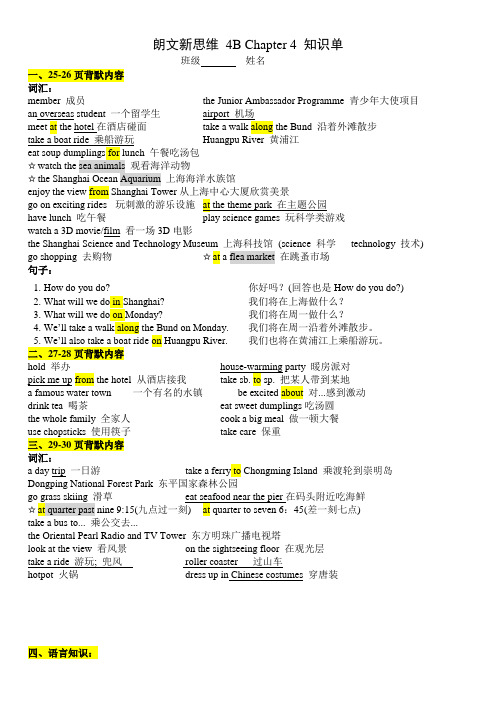
朗文新思维 4B Chapter 4 知识单班级 姓名__________一、25-26页背默内容词汇:member 成员 the Junior Ambassador Programme 青少年大使项目一个留学生 沿着外滩散步 take a boat ride 乘船游玩eat soup dumplings for lunch 午餐吃汤包☆watch the sea animals 观看海洋动物☆the Shanghai Ocean Aquarium 上海海洋水族馆enjoy the view from Shanghai Tower go on exciting rides 玩刺激的游乐设施 have lunch 吃午餐watch a 3D movie/film 看一场3D 电影the Shanghai Science and Technology Museum 上海科技馆 (science 科学 technology 技术) go shopping 去购物 ☆at a flea market 在跳蚤市场句子:二、27-28页背默内容house-warming party 暖房派对从酒店接我 take sb. to sp. 把某人带到某地一个有名的水镇 be excited about 对...感到激动 drink tea 喝茶 eat sweet dumplings 吃汤圆the whole family 全家人 cook a big meal 做一顿大餐use chopsticks 使用筷子 take care 保重三、29-30页背默内容词汇:a day trip 一日游 take a ferry to Chongming Island 乘渡轮到崇明岛 Dongping National Forest Park 东平国家森林公园go grass skiing 滑草 ☆at quarter past nine 9:15(45(差一刻七点) take a bus to... 乘公交去... the Oriental Pearl Radio and TV Tower 东方明珠广播电视塔look at the view 看风景 on the sightseeing floor 在观光层take a ride 游玩; 兜风 roller coaster 过山车hotpot 火锅 dress up in Chinese costumes 穿唐装四、语言知识:1. How do you do? 你好吗?(回答也是How do you do?)2. What will we do in Shanghai? 我们将在上海做什么?3. What will we do on Monday? 我们将在周一做什么?4. We ’ll take a walk along the Bund on Monday. 我们将在周一沿着外滩散步。
朗文少儿英语巩固级U4

Conclusion
Camels live in the hot desert. Crocodiles and fish live in lakes and rivers.
Whales and fish live in the occean. Deer live in the cool forest.
可数名词用复数形式表示一类, 不可数名词直接表示一类。
Exercise
1. Camels live in the hot desert.
Where do camels live ____________________?
2. Crocodiles live in lakes and rivers.
_____________________?
Where do crocodiles live
Exercise
3. Whales and fish live in the occean.
Where do whales and fish live ________________________?
4. Deer live in the cool forest.
Unit 4 Animal Homes
博之教育东营分校
Mabel
a. Knowledge aims: By the end of the class , the children can read and spell the words: camel, desert, ect.And they can use the phrase “live in ” to make sentences. b. Ability aims By the end of the class , the children can use oral English to express something about the animals and their living enrivoments.
2023年朗文新派少儿英语巩固级知识点

Actions:senseseehearsmelltastefeel
Body Parts:eyesearsnosetonguefingers
形容词:good /nice—badhappy—sadloud—low
hard—softsoursweetbitterhotsaltydeliciousgreat
1 Listen, read and say: (规定:每天15分钟)
Student Book: P83;
2抄写四会词,每天两遍,不写汉语意思;
3 WB:P70-2
Teacher’s suggestion
亲爱旳孩子们,今天我们学习了好多类型旳电视节目和某些与电影电视有关旳事物。你喜欢看那种电视节目呢?为何喜欢呢?它们都在什么时间哪个频道上映呢?每个人要想好两个以上旳电视节目哦,下次我们来讨论!
第22次课Unit 9 TV and Movies(4)
教师:日期:年月日
Words
四会词:
opinion见解favorite最喜欢旳great很好旳about有关三会词:
scene场景bored厌烦旳,无聊旳scared胆怯旳
interested感爱好旳
Phrases
take…out把…带出去hurry up赶紧
10.It (feels) (hard).
11.They (look) (sad).
12.Yesterday we went to the (park).
13.The weather was (rainy).
14.We were (sad).
Songs
1.<Rain, rain, go away.>2.<You are my sunshine.>
4A朗文Chapter 4和5知识点梳理

4A朗文Chapter 4与5知识点梳理【必讲知识点】1、辨析 few,a few, little, a little:few 极少,几乎没有表示“否定”意义接可数名词复数形式a few 少许表示“肯定”意义接可数名词复数形式little 极少,几乎没有表示“否定”意义接不可数名词a little 少许表示“肯定”意义接不可数名称2、 fewer与 less都可以表示“更少”(1) fewer 后接可数名词得复数形式,就是 few得比较级(2) less 后接不可数名词,就是 little得比较级3、辨析 much,many, so much与 so manyso much 如此多接不可数名词so many 如此多接可数名词得复数形式much 许多接不可数名词many 许多接可数名词得复数形式4、 a lot of = lots of 表示许多,后可接可数名词得复数形式以及不可数名词。
5、 stop 用法stop to do 停止去做另外一件事stop doing 停止做某事(指手头得事)6、There be句型得一般过去时1.肯定式there be句型得一般过去时表示过去某地或某时存在某人或某物,其一般过去时态得陈述句由“there+was/were+主语+地点状语+时间状语”构成。
there was后接单数名词;there were后接复数名词。
例如:There was a car under the tree a moment ago、刚才这棵树下有一辆小轿车。
There were two foreign teachers in our school last year、去年我们学校有两名外教。
2.否定式there be句型一般过去时得否定式就是在动词was或were得后面加not,可缩写为wasn’t或weren’t。
例如:There wasn’t a film in the cinema last night、昨晚电影院里没有演电影。
朗文新派少儿英语基础级第4单元知识点

Words
四会词:
community社区between在…和…之间
三会词:
thermometer温度计letter信
town城镇city都市,城市
Sentences
Where is the (video shop)音像店在哪里
The (video shop) is between the (supermarket) and the (bank).音像店在(超市)和(银行)之间。
are walking on the street.我们正在街上走. We see a fire truck in the fire station!
我们看到一辆消防车在消防局里.
“Hello, firefighter!” we say.
“你好,消防员!”我们说.
is the end of our trip.我们的旅行要结束了. We get ice cream cones and eat at the park.我们买了冰淇淋在公园里吃.
street(街道) video shop(音像店)
(每个5遍)并背诵
Unit 4 My Community(2)
深入词汇
单词归类
video shop(音像店)post office(邮局)
street(街道)supermarket(超市)
bank(银行)police station警察局
restaurant(饭店) hospital(医院)
Unit 4 My Community(1)
了解词汇
bank(银行) movie theater(电影院) fire station(消防局)police station(警察局)hospital(医院) restaurant(饭店)
4A朗文Chapter4及5知识点梳理

【必讲知识点】1.辨析 few,a few,little ,a little :few 很少,几乎没有表示“否认”意义接可数名词复数形式 a few 少量表示“必定”意义接可数名词复数形式little 很少,几乎没有表示“否认”意义接不行数名词 a little 少量表示“必定”意义接不行数名称2.fewer 与 less都能够表示“更少”(1) fewer 后接可数名词的复数形式,是few 的比较级(2)less后接不行数名词,是 little 的比较级3.辨析 much,many,so much 与 so manyso much 这样多接不行数名词so many 这样多接可数名词的复数形式much 很多接不行数名词many 很多接可数名词的复数形式4.a lot of = lots of 表示很多,后可接可数名词的复数形式以及不行数名词。
5.stop 用法stop to do 停止去做此外一件事stop doing 停止做某事(指手头的事)1.必定式there be 句型的一般过去时表示过去某地或某时存在某人或某物,其一般过去时态的陈说句由“there+was/were+主语+地址状语+时间状语”组成。
there was 后接单数名词; there were 后接复数名词。
比如:There was a car under the tree a moment ago刚.才这棵树下有一辆小轿车。
There were two foreign teachers in our school last year.昨年我们学校有两名外教。
2.否认式there be 句型一般过去时的否认式是在动词 was 或 were 的后边加 not,可缩写为 wasn’t或 weren’t。
比如:There wasn ’ t a film in the cinema last night昨晚.电影院里没有演电影。
There weren’ t any women doctors then当时.没有女医生。
朗文新派少儿英语巩固级第4单元知识点

Student Book: P32-1,P34
2抄写四会词和句子,每个两遍,不写汉语意思,背四会词
3 WB:P29
#
Unit4 Animal Homes(动物的家)(2)
)
Words
四会词:
Animal:polarbear北极熊zebra斑马penguin企鹅ostrich鸵鸟whale鲸鱼dolphin海豚
walk走climb攀登crawl爬sing唱歌
三会词:march行进,前进
Phrases
go marching行进two by two两个两个的tie one’s shoe系鞋带
Song
<Go Marching>
—
Grammer
Review:
1.人称代词主格,在句子里做主语:I , you, he, she, it ,we, you,they
5. Dowhales live in theforest
Yes, they do. / No, they don’t. They live in theocean
Homework
1 Listen, read and say: (要求:每天15分钟)
Student Book:Unit4
2.练习册做完。
legs. I canswim. I can’tfly. What am I
Describe Animals.
【
Model:Chimpanzees live inthe hot jungle. They areblack and strong.
They havelong arms and they don’t have tails. They areclever.
最新4A朗文Chapter-4和5知识点梳理资料
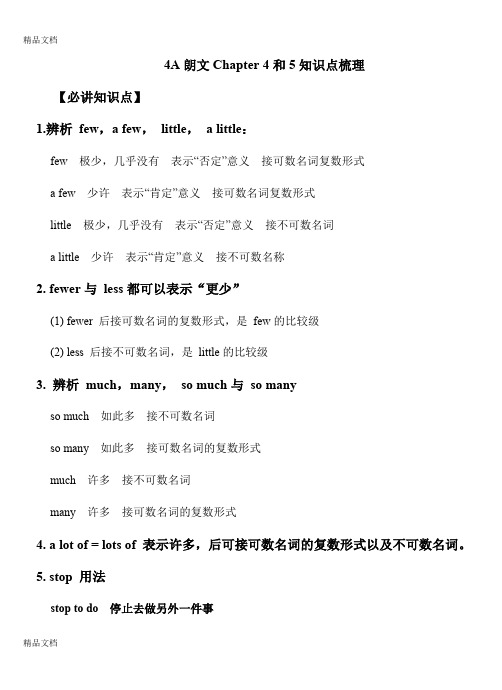
4A朗文Chapter 4和5知识点梳理【必讲知识点】1.辨析few,a few,little,a little:few 极少,几乎没有表示“否定”意义接可数名词复数形式a few 少许表示“肯定”意义接可数名词复数形式little 极少,几乎没有表示“否定”意义接不可数名词a little 少许表示“肯定”意义接不可数名称2. fewer与less都可以表示“更少”(1) fewer 后接可数名词的复数形式,是few的比较级(2) less 后接不可数名词,是little的比较级3. 辨析much,many,so much与so manyso much 如此多接不可数名词so many 如此多接可数名词的复数形式much 许多接不可数名词many 许多接可数名词的复数形式4. a lot of = lots of 表示许多,后可接可数名词的复数形式以及不可数名词。
5. stop 用法stop to do 停止去做另外一件事stop doing 停止做某事(指手头的事)6.There be句型的一般过去时1.肯定式there be句型的一般过去时表示过去某地或某时存在某人或某物,其一般过去时态的陈述句由“there+was/were+主语+地点状语+时间状语”构成。
there was后接单数名词;there were后接复数名词。
例如:There was a car under the tree a moment ago. 刚才这棵树下有一辆小轿车。
There were two foreign teachers in our school last year. 去年我们学校有两名外教。
2.否定式there be句型一般过去时的否定式是在动词was或were的后面加not,可缩写为wasn’t或weren’t。
例如:There wasn’t a film in the cinema last night. 昨晚电影院里没有演电影。
最新香港朗文4B第四单元知识要点 词汇语法
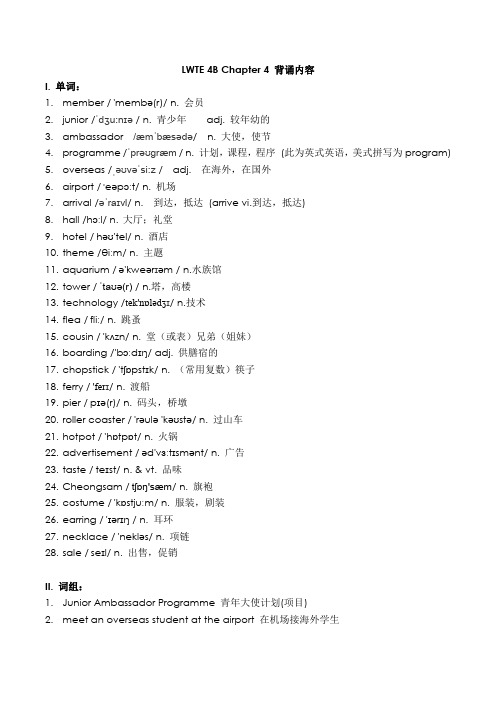
LWTE 4B Chapter 4 背诵内容I. 单词:1.member /'membə(r)/ n. 会员2.junior /ˈdʒu:nɪə / n. 青少年adj. 较年幼的3.ambassador /æmˈbæsədə/ n. 大使,使节4.programme /ˈprəʊgræm / n. 计划,课程,程序(此为英式英语,美式拼写为program)5.overseas /ˌəʊvəˈsi:z / adj. 在海外,在国外6.airport / 'eəpɔːt/ n. 机场7.arrival /əˈraɪvl/ n. 到达,抵达(arrive vi.到达,抵达)8.hall /hɔːl/ n.大厅;礼堂9.hotel /həʊ'tel/ n. 酒店10.the me /θiːm/ n. 主题11.aquarium /ə'kweərɪəm / n.水族馆12.tower /ˈtaʊə(r) / n.塔,高楼13.technology /tek'nɒlədʒɪ/ n.技术14.flea /fliː/ n. 跳蚤15.cousin /'kʌzn/ n. 堂(或表)兄弟(姐妹)16.boarding /'bɔːdɪŋ/ adj. 供膳宿的17.chopstick /'tʃɒpstɪk/ n. (常用复数)筷子18.ferry /'ferɪ/ n. 渡船19.pier /pɪə(r)/ n. 码头,桥墩20.roller coaster /'rəulə 'kəʊstə/ n. 过山车21.hotpot /'hɒtpɒt/ n. 火锅22.advertisement /əd'vɜːtɪsmənt/ n. 广告23.taste /teɪst/ n. & vt. 品味24.Cheongsam /tʃɒŋ'sæm/ n. 旗袍25.costume /'kɒstjuːm/ n. 服装,剧装26.earring /'ɪərɪŋ / n. 耳环27.necklace /'nekləs/ n. 项链28.sale /seɪl/ n. 出售,促销II. 词组:1.Junior Ambassador Programme 青年大使计划(项目)2.meet an overseas student at the airport 在机场接海外学生3.meet at the airport在机场见面meet at the hotel在酒店见面4.take a walk along the Bund 沿着外滩散步5.take a boat ride on Huangpu River 在黄浦江上乘船游玩6.eat soup dumplings for lunch 午餐吃汤包7.go on exciting rides at a famous theme park 在一个著名的主题公园参加令人兴奋的骑乘类项目8.watch the sea animals at the Shanghai Ocean Aquarium 在上海海洋水族馆观看海洋动物9.enjoy the view from Shanghai Tower at night 夜晚从上海中心大厦欣赏风景10.play science games and watch a 3D movie at the Shanghai Science andTechnology Museum (3D 3-dimensional 三维的)在上海科技馆玩科学游戏和观看三维电影11.go shopping at a flea market 在跳蚤市场购物12.life at boarding school 寄宿学校的生活13.have a wonderful time 过得很愉快/度过美好时光14.look after = take care of 照顾15.hold a big house-warming party 举行一次盛大的乔迁之喜派对16.pick me up from the hotel 到酒店来接我17.go to his uncle’s new house 去他叔叔的新家18.take sb. to a famous water town in Qingpu带…去青浦著名的水镇19.drink tea and eat sweet dumplings喝茶和吃汤圆20.be excited about 对…感到激动21.the whole family 整个家族(家庭)all my family 我全家22.help to cook a big meal 帮忙做一顿大餐23.take care 保重24.day trip 当日往返的短途游25.(a) quarter past nine九点过一刻(十五分)26.(a) quarter to seven 六点三刻(四十五分)/七点差一刻27.take a ferry to Chongming Island 乘渡船去崇明岛28.go to Dongping National Forest Park 去东平国家森林公园29.go grass skiing 去滑草30.visit Chongming Museum 参观崇明博物馆31.eat seafood near the pier 在码头附近吃海鲜32.take a bus to the Oriental Pearl Radio & TV Tower 乘公交去东方明珠广播电视塔33.look at the view on the sightseeing floor 在观光层看风景34.take a ride on the VR roller coaster 搭乘虚拟现实过山车(VR Virtual Reality 虚拟现实)35.take a walk in Huangpu Park 在黄浦公园散步36.eat hotpot for dinner 晚餐吃火锅37.a taste of China 中国的味道38.people with a sweet tooth 甜食爱好者39.dress up in Chinese costumes 穿上中式服装盛装打扮40.earrings and necklaces on sale 耳环和项链廉价出售41.20% off 打八折(% 百分号,念做percent/pə'sent/百分比)42.pen friend 笔友43.in the end 最后上海地名:the Bund外滩Huangpu River黄浦江Shanghai Ocean Aquarium 上海海洋水族馆Shanghai Tower上海中心大厦Shanghai Science and Technology Museum 上海科技馆Chongming Island崇明岛Dongping National Forest Park 东平国家森林公园the Oriental Pearl Radio & TV Tower 东方明珠广播电视塔Huangpu Park 黄浦公园III. 句子:1.How do you do? 你好!(旧式的问候语,并非在提问,需用陈述句语调,且回答也是Howdo you do?)2.What will we do in Shanghai?我们将在上海做什么?3.T om’s father will pick me up from the hotel at nine in the morning. 汤姆的爸爸上午9点会在酒店接我。
朗文英语 chapter4 重点
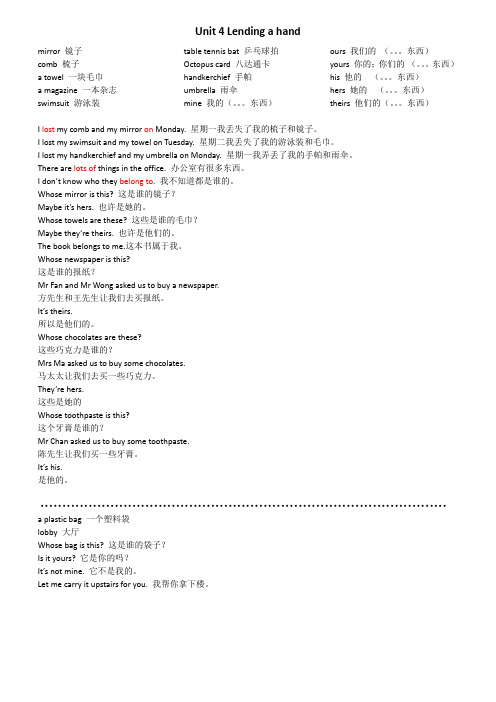
Unit 4 Lending a handmirror 镜子comb 梳子a towel 一块毛巾a magazine 一本杂志swimsuit 游泳装table tennis bat 乒乓球拍Octopus card 八达通卡handkerchief 手帕umbrella 雨伞mine 我的(。
东西)ours 我们的(。
东西)yours 你的;你们的(。
东西)his 他的(。
东西)hers 她的(。
东西)theirs 他们的(。
东西)I lost my comb and my mirror on Monday. 星期一我丢失了我的梳子和镜子。
I lost my swimsuit and my towel on Tuesday. 星期二我丢失了我的游泳装和毛巾。
I lost my handkerchief and my umbrella on Monday. 星期一我弄丢了我的手帕和雨伞。
There are lots of things in the office. 办公室有很多东西。
I don’t know who they belong to. 我不知道都是谁的。
Whose mirror is this? 这是谁的镜子?Maybe it’s hers. 也许是她的。
Whose towels are these? 这些是谁的毛巾?Maybe they’re theirs. 也许是他们的。
The book belongs to me.这本书属于我。
Whose newspaper is this?这是谁的报纸?Mr Fan and Mr Wong asked us to buy a newspaper.方先生和王先生让我们去买报纸。
It’s theirs.所以是他们的。
Whose chocolates are these?这些巧克力是谁的?Mrs Ma asked us to buy some chocolates.马太太让我们去买一些巧克力。
1年级朗文小学英语第四单元总结复习
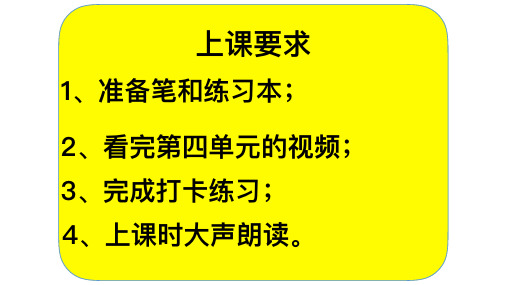
上课要求1、准备笔和练习本;2、看完第四单元的视频;3、完成打卡练习;4、上课时⼤声朗读。
黄良光Johnny疯狂语言创始人疯狂语言网校校长疯狂语言十大讲师之一 青少年成长导师Chapter 4 More about animalsWalking,WalkingWalking,WalkingWalking, walking. Walking, walking.Hop, hop, hop. Hop, hop, hop.Running, running, running. Running, running, running.Now let's stop. Now let's stop.elephant panda tiger monkey lion zebra snakekangaroo hippoReview:skip run swim jumpread draw writeWhat is the elephant doing?What is the elephant doing?The elephant is sleeping.It is sleeping.sleep sleep ing询问正在做什么--What is __ doing? (单数) What is the elephant doing? --_________is V.ing. / It is V.ing.The elephant is sleeping.It is sleeping.What is the hippo doing? The hippo is eating.It is eat ing.eat eat ingWhat is the panda doing?The panda is reading.read readingIt is reading.What is the girl doing? The girl is walking. walk walk ingWhat is the boy doing?The boy is jumping. jump jump ingWhat is the girl doing? The girl is singing.sing sing ingWhat are the tiger s doing? They are fighting.The tigers are fighting.f igh t f igh ting.-What are______doing? (复数)-_________are V.ing.-They are V.ing.The boys are fighting.What are the boys doing?What are the boys doing?jump jumpingsleeping eating walking fighting singing read ing sleepeatfightwalksing read 直接加ing.Let’s chant.~ing (Present Continuous Tense)eat ing .isare ItThey do ing?isare the snake the monkey the lion s the tiger sWhatWhat is the zebra doing?runrun n The zebra is running .run ning , run ning .The zebra is run ning . 复写末尾的字母加ing.ingWhat is the turtle doing?swimswim m The turtle is swimming .swim ming , swim ming .The turtle is swim ming . 复写末尾的字母加ing.ingWhat is the rabbit doing?hop hop p The rabbit is hopping.hopping, hopping .The rabbit is hop ping .复写末尾的字母加ing.inghop 单脚跳,小动物蹦蹦跳跳jump 跳,双脚离地What is the girl doing?skip skip p The girl is skipping.skipping, skipping .The girl is skip ping .复写末尾的字母加ing.ing写出下列单词的ing形式。
朗文英语4A 重点单词句型

Sentences:What do you like doing in your spare time? What do you like doing when you’re free?I like roller-skating, painting and reading. She doesn’t like reading or singing.They can play chess.你业余时间喜欢做什么?你业余时间喜欢做什么?我喜欢溜冰、绘画和阅读。
她不喜欢读书或唱歌。
他们可以下棋。
Sentences:Do you ever tidy your room? Yes, I usually tidy my room. Does he ever surfer the Net? No, he never surfs the Net.This is my best friend, Ken.He likes playing sport.He plays a lot of sport every week. 你曾经整理你的房间吗?是的,我通常整理房间。
他曾经上网吗?不,他从不上网。
这是我最好的朋友,肯。
他喜欢运动。
他每周运动一次。
Sentences:Was there any fast food when you were young, Grandma? Yes, there was.No, there wasn’t.Were there any comics when you were young, Grandpa?Yes, there were.No, there weren’t.Did you were trainers fifty years ago?Yes, I did.No, I didn’t. Rich people had telephones at home but poor people didn’t.当你(您)年轻时有什么快餐,奶奶?是的,有。
朗文4AChapter4复习提要(推荐文档)
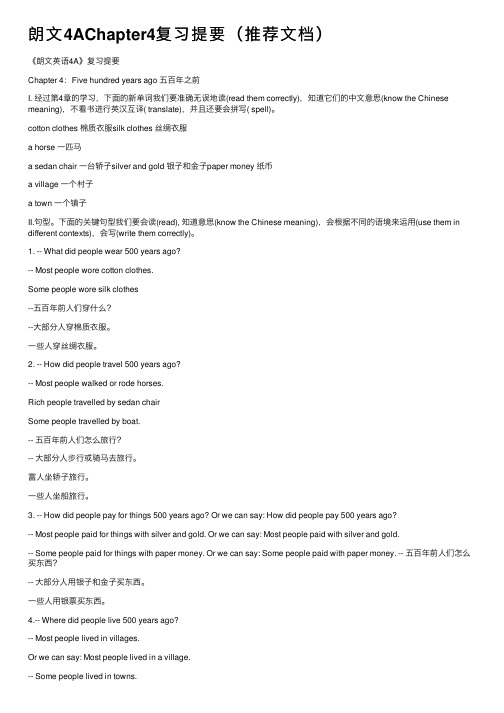
朗⽂4AChapter4复习提要(推荐⽂档)《朗⽂英语4A》复习提要Chapter 4:Five hundred years ago 五百年之前I. 经过第4章的学习,下⾯的新单词我们要准确⽆误地读(read them correctly),知道它们的中⽂意思(know the Chinese meaning),不看书进⾏英汉互译( translate),并且还要会拼写( spell)。
cotton clothes 棉质⾐服silk clothes 丝绸⾐服a horse ⼀匹马a sedan chair ⼀台轿⼦silver and gold 银⼦和⾦⼦paper money 纸币a village ⼀个村⼦a town ⼀个镇⼦II.句型。
下⾯的关键句型我们要会读(read), 知道意思(know the Chinese meaning),会根据不同的语境来运⽤(use them in different contexts),会写(write them correctly)。
1. -- What did people wear 500 years ago?-- Most people wore cotton clothes.Some people wore silk clothes--五百年前⼈们穿什么?--⼤部分⼈穿棉质⾐服。
⼀些⼈穿丝绸⾐服。
2. -- How did people travel 500 years ago?-- Most people walked or rode horses.Rich people travelled by sedan chairSome people travelled by boat.-- 五百年前⼈们怎么旅⾏?-- ⼤部分⼈步⾏或骑马去旅⾏。
富⼈坐轿⼦旅⾏。
⼀些⼈坐船旅⾏。
3. -- How did people pay for things 500 years ago? Or we can say: How did people pay 500 years ago?-- Most people paid for things with silver and gold. Or we can say: Most people paid with silver and gold.-- Some people paid for things with paper money. Or we can say: Some people paid with paper money. -- 五百年前⼈们怎么买东西?-- ⼤部分⼈⽤银⼦和⾦⼦买东西。
朗文少儿英语教案-LEW 4A U4 In the old days!教案

PRT精品课大赛教案
1.T: Read and think about the following questions.
2. T: Group work and discuss, finish the worksheet and share with the class.
1. Listen to the interview and t hink: What surprises you most about Grandpa’s childhood?
2. Role play the interview.(学生分组扮演,其他学生打分,选出最佳表演奖)
1. Imagine you are Harry, and you need to make a report about your grandfather. Here is a
T:In the old days, my grandfather lived in a small house. It was freezing cold in winter and boiling hot in summer. Now, people live in big house. It’s very comfortable…
2. 学生分两组分别完成另外两个部分的填写及陈述,小组活动交换信息,最后总结。
3.Just now we have talked about Harry’s grandfather. How about your grandfather? Using this mind-map to help you(课前一周布置孩子回家做中文问卷调查自己的爷爷或奶奶)
1.读书打卡U5进行预习;
2.用英文采访家人(爷爷奶奶或爸爸妈妈)过去的生活。
- 1、下载文档前请自行甄别文档内容的完整性,平台不提供额外的编辑、内容补充、找答案等附加服务。
- 2、"仅部分预览"的文档,不可在线预览部分如存在完整性等问题,可反馈申请退款(可完整预览的文档不适用该条件!)。
- 3、如文档侵犯您的权益,请联系客服反馈,我们会尽快为您处理(人工客服工作时间:9:00-18:30)。
come from来自….
It comes frome Chinese.它来自于中国。
Song
<In the jungle> P35--8
Speaking Practice
Guess a riddle.
Model: I’m abird. I’mblack and white.I liveon the ice.I havetwo
第21次课Unit4 Animal Homes(动物的家)(5)复习课
教师:日期:
Words
四会词:Animal:bear熊elephant大象lion狮子monkey猴子fish鱼
kangaroo袋鼠camel骆驼bird鸟crocodile鳄鱼deer鹿
parrot鹦鹉chimpanzee黑猩猩polar bear北极熊zebra斑马
Student Book: P37,P38;
2回答Questቤተ መጻሕፍቲ ባይዱons部分的问题,写在作业本上;
3尽量能做到复数小故事。
Teacher’s suggestion
到现在为止,我们学习了好多动物,而且了解了他们的生活环境,孩子们,你能用英文介绍出多少种动物呢?在家里把他们都介绍给爸爸妈妈听吧,你们是最棒的!
第19次课Unit4 Animal Homes(动物的家)(3)
教师:日期:
Words
四会词:
hot热的cold冷的warm温暖的cool凉爽的
三会词:
mighty大的near靠近village村庄peaceful安宁的
fun有趣的fact事实carry携带pouch袋
show展现paw手掌dinosaur恐龙owl猫头鹰
2.可数名词以“s,x, o ,sh, ch”结尾,变复数,在单词结尾加”es“
Sentences
1.What can bears do?
They can run.
2.What can’t bears do?
They can’t fly.
3.Bears canrun and walk. But now they aresleeping.
They cando many things.
Homework
1 Listen, read and say: (要求:每天15分钟)
Student Book: P37,P38(预习小故事);
2 WB:P33;
3仿照SB:P39上的“Make an animal book”,画一幅动物,并写一篇介绍它的短文;(用大白纸)
Phrases
look for寻找(表示过程,不知道结果)
find找到(强调结果)
Questions
Story:<Why the owl says,”Who”>
1.There are many birds in the forest.
Whosings in the trees?
Whocomes from the plains?
Homework
1 Listen, read and say: (要求:每天15分钟)
Student Book: P32,P33
2抄写四会词和句子,每个两遍,不写汉语意思
3 WB:P27,P34
Teacher’s suggestion
亲爱的孩子们,今天我们学习了动物的家,现在你们知道各种动物生活在哪里了吗?今天我们有一项特别作业哟,回去查找资料,看看我们学习的这些动物都有些怎样有趣的生活习性?比如,鸵鸟真的会把头藏在沙子里吗?猴子生气的时候会有什么表示呢?下次课讲给大家听,知道的多、讲的好的同学老师会给10★哟!
第18次课Unit4 Animal Homes(动物的家)(2)
教师:日期:
Words
四会词:
Animal:polar bear北极熊zebra斑马penguin企鹅ostrich鸵鸟whale鲸鱼dolphin海豚
Place:lake湖泊river河,江ocean海洋desert沙漠jungle丛林snow and ice冰天雪地forest森林plain平原
Homework
1 Listen, read and say: (要求:每天15分钟)
Student Book: P32-1,P34
2抄写四会词和句子,每个两遍,不写汉语意思,背四会词
3 WB:P29
Teacher’s suggestion
亲爱的孩子们,我们今天见到了一些我们已经学习过的动物朋友,并认识了几个新朋友,现在,你们有没有对它们更加熟悉呢?你们知道它们都能做些什么事情,又不能做些什么事情了吗?
Where is the whale and what does it do?
1.The owl asks many animals “Who-who-who has my feather?”
2.Do the animals know?
Homework
1 Listen, read and say: (要求:每天15分钟)
Teacher’s suggestion
亲爱的孩子们,今天我们更加深入地了解了动物们的生活和习性。现在,你能写出一篇介绍动物的小短文了吗?我们可以把我们知道的他们的特殊习性也写进去哟!看看谁写的最棒!
第20次课Unit4 Animal Homes(动物的家)(4)
教师:日期:
Words
三会词:
know知道feather羽毛need需要owl猫头鹰
Sentences
1. Where docamels live?Camels live in thehot desert.
2. Dowhales live in theforest?
Yes, they do./No, they don’t. They live in theocean.
Song
<Go Marching>复习
2.The bird who has no feathers sits in a tree, she cries and cries.
Whatdoes shesay?
3.What do the birds do to help the bird with no feather?
4.The monkey jumps in the jungle.
legs. I canswim. I can’tfly. What am I?
Describe Animals.
Model:Chimpanzees live inthe hot jungle. They areblack and strong.
They havelong arms and they don’t have tails. They areclever.
penguin企鹅ostrich鸵鸟whale鲸鱼dolphin海豚owl猫头鹰
Place:lake湖泊river河,江ocean海洋desert沙漠
jungle丛林snow and ice冰天雪地forest森林plain平原
Action:fly飞jump跳run跑swim游泳
walk走climb攀登crawl爬sing唱歌
第17次课Unit4 Animal Homes(动物的家)(1)
教师:日期:年月日
Words
四会词:
Animal:bear熊elephant大象lion狮子monkey猴子
fish鱼kangaroo袋鼠camel骆驼bird鸟
crocodile鳄鱼deer鹿parrot鹦鹉chimpanzee黑猩猩
Action:fly飞jump跳run跑swim游泳
walk走climb攀登crawl爬sing唱歌
三会词:march行进,前进
Phrases
go marching行进two by two两个两个的tie one’s shoe系鞋带
Song
<Go Marching>
Grammer
Review:
1.人称代词主格,在句子里做主语:I , you, he, she, it ,we, you,they
4. Where docamels live?Camels live in thehot desert.
5. Dowhales live in theforest?
Yes, they do./No, they don’t. They live in theocean
Homework
1 Listen, read and say: (要求:每天15分钟)
hot热的cold冷的warm温暖的cool凉爽的
三会词:mighty大的near靠近village村庄peaceful安宁的fun有趣的
fact事实carry携带pouch袋show展现paw手掌need需要
dinosaur恐龙owl猫头鹰march行进,前进know知道feather羽毛
Phrases
e from….2. look for…
Sentences
1.What can bears do?They can run.
2.What can’t bears do?They can’t fly.
3.Bears canrun and walk. But now they aresleeping.
Student Book:Unit4
2.练习册做完。
Teacher’s suggestion
学完了这个单元,你能够写出一篇小作文来吗?以《My favorite animal》为题,试试看,描述一下小动物的外貌和生活环境以及它的一些特点和你为什么喜欢?
写好后就和我一同来分享吧!
